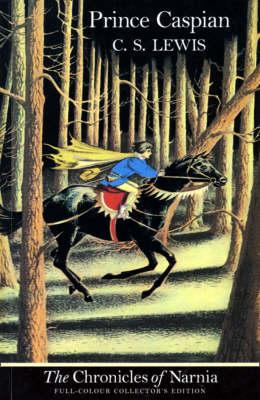 Here’s the problem. In 1933, Walt Disney adapted the classic tale of the Three Little Pigs into an animated short. It was an unexpected crossover success. Audiences loved the pigs, and loathed the wolf, who they saw as a symbol of the Depression. “Who’s afraid of the Big Bad Wolf?” became a national rallying cry. Disney made some other shorts starring these characters, but somehow they didn’t make the impact the original did. His verdict: “you can’t follow pigs with pigs.”
Here’s the problem. In 1933, Walt Disney adapted the classic tale of the Three Little Pigs into an animated short. It was an unexpected crossover success. Audiences loved the pigs, and loathed the wolf, who they saw as a symbol of the Depression. “Who’s afraid of the Big Bad Wolf?” became a national rallying cry. Disney made some other shorts starring these characters, but somehow they didn’t make the impact the original did. His verdict: “you can’t follow pigs with pigs.”
CS Lewis follows pigs with pigs here – or to be more exact, he follows pigs with a single half-sized runt of a pig that has mange, watery eyes, and a cracked hoof.
Why does this book exist? It’s not bad. It just doesn’t make a case that it ever needed to be written. Narnia is again under the yoke of oppression, and the Pevensie children have to save it. Usually when writers re-tell the same story, they up the stakes, often to the point where it becomes ridiculous (the Rocky series eventually had Sylvester Stallone going twelve rounds against international communism). Prince Caspian does the reverse, lower the stakes. Why?
This is a 5% milk version of TLTWATW . Queen Jadis was evil incarnate, King Miraz is a unmemorable fop. Once the fate of the world hung in the balance, now we’re resolving an dispute of Narnian regency. Exciting! Caspian never seems heroic or kingly – he does nothing except blow a horn and invite the Pevensies back to Narnia, where they immediately take over and virtually evict him from his own book. Even Lewis’s imagination fails to find cruise control mode: there’s no bits of whimsical imagery like the lamppost in the forest, or the faun with the umbrella.
It didn’t have to be this way. Prince Caspian could have been its own book, like the later Narnia titles. The hooks are all there. For example, we know the Pevensie children grew to adulthood in Narnia, before returning to their own world and their childhood bodies. How did this affect them? Apparently it didn’t. They still talk and act like upper middle class British schoolchildren. Why weren’t they transformed and left alien by their experiences? Why wasn’t their return to the human world marked by misbehavior and disassociation as they struggled to adapt? There’s so much material for a story here, so why did Lewis run a repeat?
There’s two great scenes in this book. The first is the early scenes between Caspian and Dr Cornelius – it’s exciting and well-paced, the way the conspiracy unfolds little by little. The second is the chapter “Sorcery and Sudden Vengeance”, where a disgruntled dwarf tries to overthrow Miraz by bringing the spirit of Jadis back. Unusually intense and almost diabolical – moments like this are why not all Christians are comfortable with Lewis’s subject matter. “No one hates better than me.”
Two exciting moments, that hint at Lewis stretching himself as a storyteller and a thinker. The rest of the book is like a musician working the scales. In a way, the title seems to refer to the book’s own stature. It’s a Prince, but TLTWATW remains the king, and it has no enchanted horn to blow.
No Comments »
 Here’s a good way to tell how enthralled by a celebrity you are – what’s the least valuable thing you’d want to own of theirs?
Here’s a good way to tell how enthralled by a celebrity you are – what’s the least valuable thing you’d want to own of theirs?
Ace Frehley’s guitar pick? Kylie Jenner’s toothbrush? Paul McCartney’s used handkerchief? When Britney Spears shaved her head, her hairs were sold for $16 each. A hotel plumber once showed up on 4chan offering to sell Selena Gomez’s used bathwater for $35 a pint.
If you’re a fan of “noir prophet of the cyberpunk subgenre” (Wikipedia’s words, not mine) William Gibson, here’s your chance to own No Maps For These Territories, a documentary that simulates a long and boring car ride with Gibson in the back seat.
“On an overcast morning in 1999, William Gibson, father of cyberpunk and author of the cult-classic novel Neuromancer, stepped into a limousine and set off on a road trip around North America. The limo was rigged with digital cameras, a computer, a television, a stereo, and a cell phone. Generated entirely by this four-wheeled media machine, No Maps for These Territories is both an account of Gibson’s life and work and a commentary on the world outside the car windows. Here, the man who coined the word “cyberspace” offers a unique perspective on Western culture at the edge of the new millennium, and in the throes of convulsive, tech – driven change.”
The point of this, I suppose, is insight porn. Just get this reclusive genius in front of a camera, and let him regale us with his genius. The problems with this documentary are twofold.
First sin (venal), William Gibson just isn’t that compelling as a speaker. He stutters. He drifts off. He sounds unsure of his own words. This is one of those times when you want a narcissistic egomaniac who loves the sound of his own voice. Harlan Ellison or Bruce Sterling would have been great in the back seat of that car, pardon my Freud.
I have friends who’ve met Gibson in person, and they concur: he’s not equipped to be the spokesperson of a movement, and furthermore, he never even wanted to play that role. he wrote a book, it blew up, and he had the role foisted on him. I keep thinking back to Dylan Avery’s 9/11 conspiracy film. All he wanted was a directorial credit, instead he became Sauron’s Mouthpiece for a movement of crazies who think the collapsing buildings were holographic projections (and ironically, this poisoned his chances of actually becoming a serious director).
But the second sin (mortal) is this:
If you want to celebrate the power of change, the 90s-2010s are an extremely underwhelming time to do it in.
In the 50s and 60s, you could feel optimism. We were roaring ahead. Lasers. Jet engines. The double helix. Man born of the Earth, stepping down a ladder to stand upon the cold regolith of the moon.
Then, it all seemed to stop. The Concorde was retired. Our technological brief is now “rebuild the things of the 50s and 60s so they’re a bit smaller and fit in your pocket”. You no longer need even a single percentage point to write NASA’s share of the budget. And we started to learn more about the environment, and our planet, which forced a shift of perspective: progress at any cost is not always a possible or worthwhile goal. Resource-wise, we’re definitely now coming down on the wrong side of the Hubbert’s bell curve. Worse than Peak Oil, we’ve also hit Peak Ideas – it seems all the $20 bills are finally gone from the sidewalk, along with the $10s, the $5s, and all but a few of the coins. Any further technological progress is likely to be slow and expensive.
The past twenty years has given us mass user adoption of the internet – a toy which was first invented in the 60s and 70s. It’s a little like picking up a jacket at the start of winter and finding that you left money in the pocket at the end of winter last year – it’s the past generation we have to thank.
How does this relate to Gibson talking in a conspicuously non-flying car?
It’s easy to be underwhelmed by prophets of the future, whether it’s cyberpunk or transhumanism or anything else. In the words of a CS Lewis character, “your wallet’s empty, your eggs addled, your fish uncaught, your promises broken. Stand aside then and let others work.”
Just look at the vernacular thrown around in the 1990s, and see how dated it seems now. Strangely, language that attempts to evoke the future ages much faster than the rest of our vocabulary. “Smooth” and “fun” sound timeless and contemporary, despite their old age. “Electrolux” and “Spectravision” sound tacky and old, like appliances you’d see around Grandma’s house.
Then you have “cyberspace,” which is supposed to sound cutting edge but is now exclusively used by politicians trying to scare old people. The cutting edge stops cutting damned quickly. If it’s a knife, it’s a knife bevelled at an extreme angle that quickly snaps, leaving bluntness behind.
Cyberpunk came, and went, and the world kept turning. It had the rise of home computing and the internet to fuel it, but mostly, I just think it was a brief fashion. Like how for a few months every white girl had a bindi on her forehead because of Gwen Stefani in the “Just A Girl” music video. Did I mention that Gibson wears dark sunglasses through much of the car trip, even when it’s overcast?
Gibson’s prognostications are interesting, but we’re still not living in the world he imagined, and I doubt we ever will. This documentary is interesting, but mostly you feel like you’re watching someone wander up a blind cul’de’sac while pronouncing he’s discovered the route to India.
No Comments »
 “One trick pony” is usually used in a disparaging way, but really, it depends on how good the trick is. Drugs are a one trick pony, but based on various after school specials I’ve seen, they’re certainly worth doing, and are probably the only thing worth doing.
“One trick pony” is usually used in a disparaging way, but really, it depends on how good the trick is. Drugs are a one trick pony, but based on various after school specials I’ve seen, they’re certainly worth doing, and are probably the only thing worth doing.
Fuan no Tane is the ultimate one trick manga. It’s a barrage of ghost tales and urban legends, 3-4 pages each, with no characters, no stories, and sometimes hardly any text. Like snowflakes, none have much effect on their own, but when they come at you as a blizzard, you soon feel very cold. And addicted. It’s hard to stop reading Fuan no Tane, but I recommend it in only small doses. You can’t exactly marathon this stuff, it’s like too many dances with China White, you overdose at a certain point and your brain shuts down.
If you were raised on urban legends about men with hooks for hands and killer toilet seat spiders, you’ll feel right at home here. Some are brutal and gory, with “The Ear-Slashing Monk” being the most memorable in this category. Others have a strong element of camp. Still others bypass camp completely, and enter a Daliesque world of postmodern absurdism. “The Eyes that Seek”, for example, involves an army of detached eyeballs rolling down the highway.
Japanese humor notoriously inaccessible to Westerners. I don’t know if these ghost stories are Japanese in origin, or if Nakayama has adapted western material, but the terror impulse is probably far more universal than laughter. A lot of these are definitely creepy – although some of the cartoony ones do take the edge off the proceedings a little. It’s a great formula from a quality assurance standpoint, too. It doesn’t matter that some of the chapters fall flat, because there’s another one straight away to take the taste away.
Nakayama followed this up with Fuan no Tane Plus (aka, More of the Same™), and more recently Kouishu Radio, (aka, More of the Same™: The Samening, Electric Boogaloo). I think this might be the only trick he’s capable of.
None of which matters to an addict, of course.
No Comments »
 Here’s the problem. In 1933, Walt Disney adapted the classic tale of the Three Little Pigs into an animated short. It was an unexpected crossover success. Audiences loved the pigs, and loathed the wolf, who they saw as a symbol of the Depression. “Who’s afraid of the Big Bad Wolf?” became a national rallying cry. Disney made some other shorts starring these characters, but somehow they didn’t make the impact the original did. His verdict: “you can’t follow pigs with pigs.”
Here’s the problem. In 1933, Walt Disney adapted the classic tale of the Three Little Pigs into an animated short. It was an unexpected crossover success. Audiences loved the pigs, and loathed the wolf, who they saw as a symbol of the Depression. “Who’s afraid of the Big Bad Wolf?” became a national rallying cry. Disney made some other shorts starring these characters, but somehow they didn’t make the impact the original did. His verdict: “you can’t follow pigs with pigs.”

